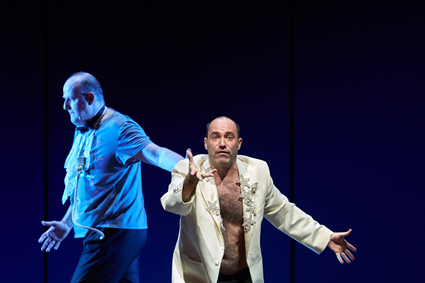| Opera Reviews | 25 April 2024 |
The end of the world? Le Grand Macabre in Zurich says: not nowby Lorenzo Fiorito |
|
| Ligeti: Le Grand Macabre
Opernhaus Zürich 3 February 2019 |
|

Jens Larsen (Astradamors), Leigh Melrose (Nekrotzar))
|
|
|
Ligeti's Le Grand Macabre staged by the Zurich Opera was a success to which contributed equally a clever direction, a coherent and intense musical direction and an excellent cast. Based on La Balade du grand macabre by the Belgian playwright Michel de Ghelderode, the libretto is by Ligeti himself and by Michael Meschke, who was the director of the Puppet theatre in Stockholm, where the opera debuted in 1978. The revised version presented in 1997 at the Salzburg Festival, Le Grand Macabre is now one of the (few) indispensable operas of the second half of the last century, a milestone that has now carved out a permanent place in the operatic repertoire. Indeed, it is a musically audacious work, a mocking apologue set in a timeless era, in a non-place called Brueghellandia, a country with dissolute habits, where the disquieting Nekrotzar abruptly arrives claiming to be "The Grand Macabre", that is Death , announcing that at midnight the world will be destroyed. Ligeti's exceptionally rich score makes much use of parody, ranging from the most acrobatic singing to complex tonal structures that distort but don’t reject the melodic, harmonic and rhythmic tradition, as well as a peculiar use of Sprechgesang. Ligeti playfully makes an inventory of pseudo-quotes ranging from Beethoven to Scott Joplin, from Schubert to Charles Ives, from Rameau to Tchaikovsky, for what he himself called an "anti-anti-opera", in open controversy with what those who in the same period theorized the death of the opera and the need to search new forms for theatre in music. When the curtain rose, after the famous prelude of twelve horns, the floor of the stage lifted, bringing to light extravagant and improbable characters reminiscent of the figures of Flemish painters Bruegel and Bosch. To represent this bizarre humanity, threatened by extinction, in the first scene there are the drunkard Piet the Pot and the two lovers Amando and Amanda (which in the first version were less modestly called Spermando and Clitoria). In the second scene we meet the disturbing couple formed by the astronomer Astradamors and his wife Mescalina, a nymphomaniac prone to sadomasochistic practices. In the third scene we find the corrupt representatives of the power of the country, the inept prince Go-Go, accompanied by his two ministers who exchange appalling abuses in alphabetical order. In the last scene, we find that the end of the world will not happen: the final Armageddon will not be there, because Nekrotzar, the Tsar of death, has a hangover, no longer finds his horse, has lost his scythe. In short, he's a muddler, or maybe just an impostor. So in Brueghellandia they go on drinking and fornicating; the Apocalypse is postponed sine die, and in a finale halfway between Stravinsky's A Rake's Progress and Verdi's concertato in Falstaff, all the characters expose the conclusive moral: death is certain, but while waiting for the end, let's enjoy life. Before the performance, it was announced that, for health reasons, Judith Schmid, who was scheduled to be Mescalina, would be replaced by Sarah Alexandra Hudarew, who, due to the short time she had to rehearse could sing, but not act. Thus, on stage it was director Tatjana Gürbaca herself to mimic the part, while Hudarew lent her voice from the side, with outlandish but suggestive results. In a difficult work to interpret, whose parts seem always to slip from grasp, as they are subject to the centrifugal force of seemingly disjointed libretto and score, Gürbaca cleverly played the role of supreme ordering principle, with her "centripetal" direction, which kept everything together in a coherent and cohesive way. Ideas flowed easily, maintaining a dynamic balance between humorous situations and eschatological message, satire and metaphysical reflection, without ever losing the common thread. Ligeti requires a lot both of the orchestra and the singers, who responded in full: the grotesque horseman of the Apocalypse, Nekrotzar, was magnificently interpreted by the baritone Leigh Melrose, who has carved out a great reputation as a 20th century opera specialist . Melrose managed admirably to render all the paranoid vitality of the character, acting always in the balance between dismay and farce. His drinking buddy, Piet the Pot, another specialist of the genre, Alexander Kaimbacher showed an agile and clear voice. Amanda and Amando were respectively Alina Adamski and Sinead O'Kelly. Prince Gogo deserves special mention, as the countertenor David Hansen gave him infantile and hysterical traits. Also the two ministers, sung by Oliver Widmer and Martin Zysset, accentuated the puerile traits of their characters. Soprano Eir Inderhaug was remarkable in the double role of Venus and the head of the "Gepopo" (the secret police). Excellent also Jens Larsen as Astradamors. The Philharmonia Zürich played extraordinarily well under the baton of Tito Ceccherini bringing unity and continuity to the kaleidoscopic score of Ligeti, also giving a recognizable sense to the seemingly more eccentric passages.
|
|
| Text ©
Lorenzo Fiorito Photo © Herwig Prammer |
|







